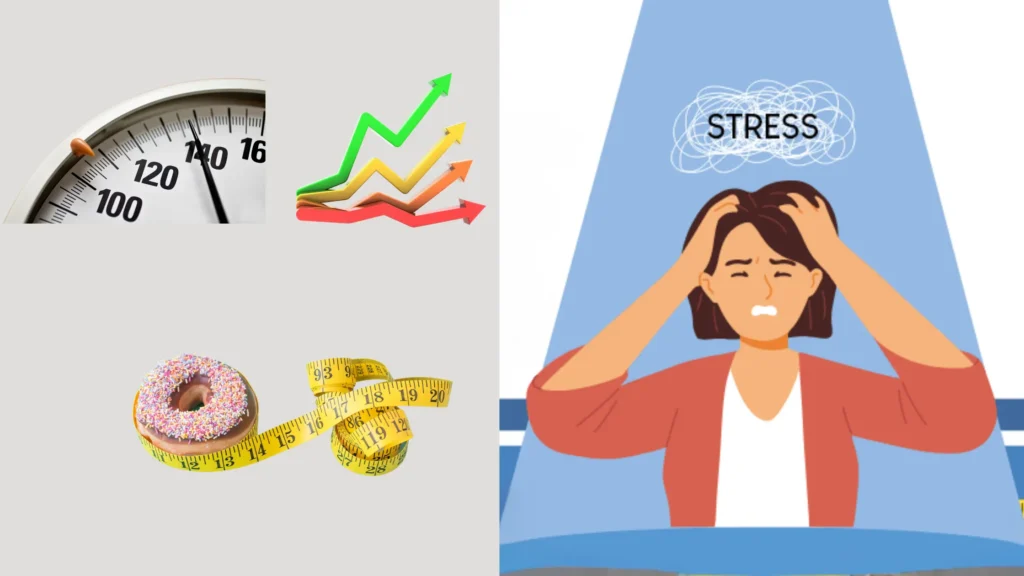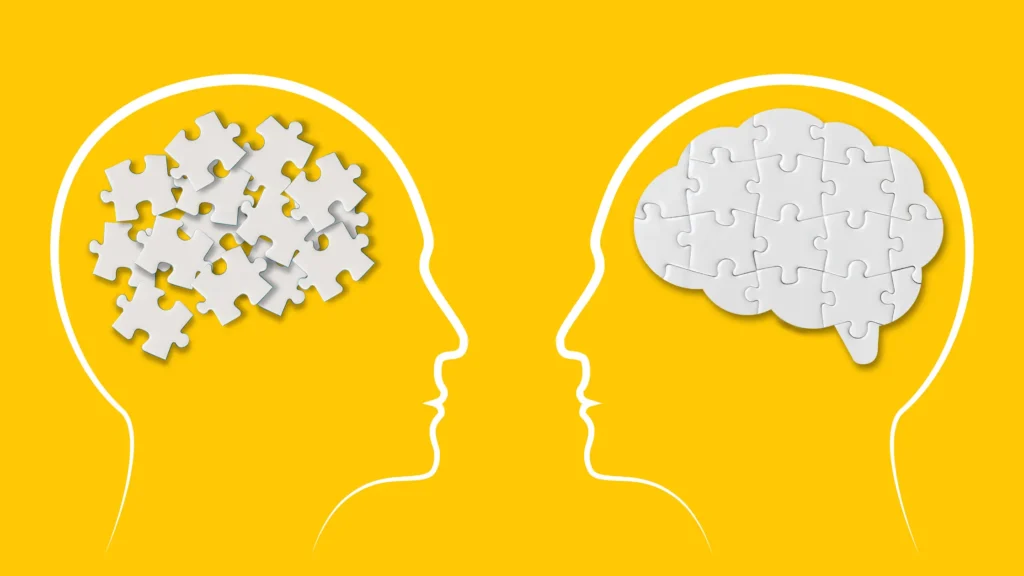Table of Contents
Introduction
When trying to lose weight, it’s important to focus on both physical and mental health. Both are key to reaching and keeping a healthy weight. When we discuss losing weight, conversations frequently revolve around diet plans, workout regimes, and calorie counts.
Our mental health is important for managing our weight. It affects our behaviors, choices, and overall success on this journey. A well-rounded approach to weight loss focuses on both mental and physical health to ensure overall balance.
Understanding the Connection Between Mental Health and Weight Loss
1.1 The Psychological Impact of Obesity

Obesity often carries significant psychological burdens, including stigma and self-esteem issues. Obese individuals often experience prejudice and discrimination from society. This can lead to feelings of inadequacy and low self-esteem.
Feeling bad about yourself can make it harder to lose weight. This is because it can affect your motivation. It can also affect your ability to make healthy choices. For example, if someone is embarrassed about their body, they may stay away from gyms or events where looks are important.
Furthermore, mental health problems may worsen as a result of the ongoing social pressure to meet specific bodily ideals. Comparing yourself to the perfect body images in the media can make you feel bad about your own body. This can also lower your self-esteem. Feeling stressed can lead to emotional eating and less physical activity, making it harder to lose weight.
1.2 Mental Health Disorders and Weight Gain

Depression and anxiety can cause weight gain by affecting how much you eat and how active you are. Depression often results in lethargy and reduced physical activity, while anxiety can trigger comfort eating as a coping mechanism. The medications used to treat these conditions can also contribute to weight gain, further complicating the picture. Recognizing these patterns is crucial for developing effective weight loss strategies that address both mental and physical health.
Depression can cause anhedonia, where someone can’t feel happy. This can make it hard for them to do activities they used to enjoy. Feeling tired and having low energy in depression can make it hard to exercise, which can lead to being less active. Anxiety can cause irregular eating habits, like not eating when not hungry or overeating when stressed.
Additionally, the medications prescribed for these mental health conditions often have side effects that include weight gain. Understanding these impacts and working with healthcare providers to find suitable treatments is essential. Therapy like CBT can help manage conditions better, possibly reducing the need for medications that make you gain weight.
1.3 The Role of Stress in Weight Management

Chronic stress can cause hormonal changes that influence appetite and metabolism, making weight reduction more difficult. When stressed, the body releases cortisol, a hormone that promotes appetite and fat accumulation, especially around the abdomen. Stress can lead to emotional eating, where people eat unhealthy foods to deal with their feelings. Managing stress through techniques such as mindfulness, exercise, and relaxation can significantly aid in weight loss.
People commonly understand the relationship between stress and weight gain. When the body is under stress, it goes into “fight or flight” mode, releasing adrenaline and cortisol. While adrenaline decreases appetite initially, cortisol’s longer-lasting effects lead to increased appetite and cravings for unhealthy foods.
Our ancestors needed extra energy to deal with immediate threats, which is linked to this biological response. However, in modern society, this response leads to the accumulation of excess calories as fat.
Moreover, stress can disrupt sleep patterns, which further complicates weight management. Lack of sleep affects the hormones ghrelin and leptin, which regulate hunger and fullness, respectively. Less leptin and higher ghrelin levels make it harder to control appetite and can lead to overeating. Therefore, addressing sleep hygiene and stress management is critical to a comprehensive weight loss plan.
Emotional Eating and its Effects
2.1 Identifying Triggers for Emotional Eating

Recognizing the triggers that lead to emotional eating is the first step in addressing this behavior. Common triggers comprise negative feelings such as despair or anger, stress, boredom, and loneliness. By writing down what you eat or using an app to track your meals, you can figure out why you overeat. This awareness is essential for creating strategies to deal with these triggers without overeating.
Understanding personal triggers requires introspection and honesty. Often, individuals may not realize the extent to which their emotions influence their eating habits. Keeping a detailed record of what and when you eat, along with your emotional state at those times, can reveal patterns. For instance, one might notice a tendency to reach for snacks during stressful work meetings or late at night when feeling lonely.
In addition to identifying triggers, it is important to understand the specific emotional needs that food fulfills. Are you eating because you are actually hungry, or are you seeking comfort, distraction, or a sense of control? Answering these questions can help in developing alternative coping strategies that do not involve food.
2.2 Strategies to Combat Emotional Eating
Achieving weight-loss objectives and reducing emotional eating require the development of healthy coping strategies. Practicing mindfulness meditation, deep breathing exercises, and hobbies can help control emotions without turning to food. Talking to friends, family, or a therapist can help you feel better and stop eating for comfort.
Mindfulness meditation involves paying attention to the present moment without judgment. This practice can help people become more aware of their emotions and eating habits. It makes it easier to notice and stop emotional eating. Breathing exercises can help manage stress and reduce the urge to eat by triggering the body’s relaxation response.
Taking part in joyful and fulfilling hobbies and activities may also serve as a healthy emotional release. Activities like gardening, reading, painting, or playing music can help manage stress and negative emotions effectively. Regular physical activity, such as walking, yoga, or sports, can also help release built-up tension and improve mood.
Furthermore, having a support system can make a significant difference. Talking to family, friends, or a therapist about your struggles with emotional eating can provide validation and practical advice. Joining a support group, either in person or online, can help you feel less isolated and provide motivation through shared experiences.
2.3 The Role of Mindfulness in Eating Habits

Mindfulness practices can help individuals become more aware of their eating habits and make more conscious food choices. To enjoy meals more and know when they are full, pay attention to the taste, texture, and smell of the food. Eat slowly. In addition to decreasing the risk of overeating, mindfulness can assist people in differentiating between emotional and physical hunger.
Mindful eating encourages a more deliberate approach to meals. Instead of eating quickly or while distracted, mindfulness emphasizes eating as a sensory experience. This can help people enjoy food more and feel satisfied, which might make them less likely to overeat.
To practice mindful eating, start by eliminating distractions, such as television or smartphones, during meals. Focus on the food’s flavors, textures, and colors.
Take small, thorough chews while noticing the flavors and how the food feels in your mouth. Pause between bites to check in with your hunger and fullness levels. This practice can help you recognize when you are satisfied, preventing overeating.
Additionally, mindfulness can help address emotional hunger. Pay attention to what your body is telling you. Your body’s signals can help you distinguish between physical hunger and emotional hunger.
Physical hunger develops gradually and can be satisfied with any type of food. Sudden emotional hunger is often linked to specific comfort foods. Recognizing these differences will help you respond to your body’s needs more appropriately.
The Impact of Mental Health on Physical Activity
3.1 Depression and Exercise Motivation

Depression can severely diminish motivation to exercise, creating a barrier to weight loss. Feeling tired, hopeless, and uninterested in activities can make it hard to exercise regularly. However, exercise is a powerful tool for managing depression, as it releases endorphins, which improve mood and energy levels. Setting small, achievable goals and gradually increasing activity levels can help overcome this barrier.
The relationship between depression and physical activity is bidirectional. While depression can reduce the motivation to exercise, engaging in physical activity can help alleviate the symptoms of depression. Exercise promotes the release of endorphins and other neurotransmitters that enhance mood and energy. Even moderate-intensity activities, such as walking or light jogging, can have significant mental health benefits.
For individuals struggling with depression, setting realistic and attainable goals is crucial. Starting with short, manageable workouts, such as a 10-minute walk, can build confidence and gradually increase motivation. As you achieve these small goals, you can incrementally increase them. Finding activities that are enjoyable and integrating them into a routine can also help sustain motivation.
Social support is another important factor. Exercise with a friend or in a group fitness class can help you stay on track. It can also help you socialize, which is good for your mental health. Additionally, seeking professional help, such as from a therapist or counselor, can provide strategies to address the emotional and psychological barriers to exercise.
3.2 Anxiety and Physical Activity

Anxiety can both promote and hinder physical activity, depending on how it manifests in an individual. Some people may use exercise as a way to manage anxiety, finding that physical activity helps calm their mind. Others may experience anxiety about exercising in public or fear injury, which can prevent them from being active. Addressing these fears through gradual exposure, supportive environments, and professional guidance can help individuals incorporate exercise into their routine.
For many, exercise can be a valuable tool for managing anxiety. Physical activity helps increase endorphin production and lower stress hormone levels like cortisol and adrenaline. These physiological changes can create a sense of well-being and relaxation that helps counteract anxiety.
However, for others, the prospect of exercising can be anxiety-inducing. Fear of judgment, embarrassment, or injury can be significant barriers. Addressing these concerns requires a thoughtful approach.
Gradual exposure to physical activity can help desensitize these fears. For instance, starting with at-home workouts or exercising in a less crowded environment can build confidence.
Creating a supportive environment is also crucial. To reduce anxiety, try a beginner class, work with a trainer, or exercise with a friend who supports you.
These activities provide encouragement and support. Each option can help you feel more confident and motivated. Choose the one that works best for you.
Professional guidance from a therapist specializing in anxiety can also be invaluable. CBT techniques can change negative thoughts about exercise and help cope with anxiety in those situations.
3.3 Building a Sustainable Exercise Routine

Creating a consistent and enjoyable exercise routine is vital for maintaining both mental health and weight loss. Finding activities that are fun and engaging increases the likelihood of sticking with an exercise program. Doing activities like dancing, hiking, swimming, or playing sports can help you stick with them in the long run. Additionally, scheduling regular exercise sessions and setting realistic goals can help establish a sustainable routine.
Individual preferences and lifestyles should be tailored to a sustainable exercise routine. The key is to find activities that are enjoyable and fit seamlessly into daily life.
You can try different types of exercise to find what you enjoy the most. This can include yoga, cycling, martial arts, or group fitness classes. Experimenting with various activities will help you discover your favorites. Mixing different activities can also prevent boredom and keep the routine exciting.
Consistency is another critical factor. Scheduling exercise sessions at regular times can help establish a habit. Setting specific, achievable goals, such as committing to three 30-minute workouts per week, can provide structure and motivation. Using tools like fitness trackers or apps to monitor progress can also be motivating.
Incorporating variety into the routine can keep it interesting and challenging. For instance, combining cardio, strength training, and flexibility exercises ensures a well-rounded fitness regimen that supports overall health. Rest days are equally important to prevent burnout and allow the body to recover.
Listening to the body and making adjustments as needed is crucial for sustainability. Pushing too hard can lead to injury or burnout, while being too lenient can hinder progress. Finding a balance that allows for consistent, enjoyable activity is key to long-term success.
The role of therapy and counseling
4.1 Cognitive-Behavioral Therapy (CBT)
CBT is an effective approach for addressing the thoughts and behaviors that contribute to weight gain. By identifying and challenging negative thought patterns, individuals can change their relationship with food and exercise. CBT can help break the cycle of emotional eating and build healthier habits, leading to sustainable weight loss.
CBT focuses on the interplay between thoughts, feelings, and behaviors. For individuals struggling with weight issues, negative thought patterns can drive unhealthy eating habits and sedentary behavior.
CBT helps people identify negative thoughts and replace them with positive and realistic ones. For example, changing “I’ll never lose weight” to “I can make small changes to be healthier.”
This process helps individuals improve their mental well-being and overall outlook on life. By challenging and changing negative thought patterns, people can experience a more positive and fulfilling life.
Therapists use various techniques to help clients develop healthier behaviors. Some examples include setting realistic goals, improving problem-solving abilities, and finding healthy ways to manage stress. Instead of turning to food, it is important to find alternative methods for coping with stress. CBT also often includes homework assignments, where clients practice new skills and reflect on their progress between sessions.
By addressing both the cognitive and behavioral aspects of weight management, CBT provides a comprehensive approach to overcoming the psychological barriers to weight loss. This can lead to more sustainable and long-lasting changes.
4.2 Support Groups and Peer Counseling
Support groups offer a sense of community and shared experience, which can be incredibly motivating. Sharing struggles and successes with others who understand the journey provides emotional support and practical advice. Peer counseling, where individuals receive guidance from those who have successfully managed their weight, can also be beneficial.
Support groups create a space where individuals can discuss their challenges and achievements without judgment. This sense of belonging and understanding can reduce feelings of isolation and provide encouragement. Group members can share practical tips and strategies that have worked for them, offering inspiration and new ideas.
Peer counseling involves individuals who have successfully navigated their own weight loss journeys providing guidance and support to others. This can be particularly motivating, as it offers a relatable perspective and proof that achieving weight-loss goals is possible. Peer counselors can share their personal experiences, offer advice, and provide accountability.
Both support groups and peer counseling can be found in various formats, including in-person meetings, online forums, and social media groups. Finding the right community can provide invaluable support and motivation throughout the weight-loss journey.
4.3 The Benefits of Regular Mental Health Check-Ins

Regular mental health check-ins can help individuals stay on track with their weight-loss journey. These check-ins provide an opportunity to discuss challenges, celebrate successes, and adjust strategies as needed. Working with a therapist or counselor ensures that mental health is consistently addressed, reducing the risk of setbacks.
Regular check-ins can help individuals monitor their progress and make necessary adjustments to their weight loss plan. These sessions can provide a safe space to discuss any emotional or psychological barriers that arise and develop strategies to overcome them. Celebrating successes, no matter how small, can boost motivation and confidence.
Therapists or counselors can offer objective insights and professional guidance. They can help individuals stay focused on their goals, provide encouragement, and offer new strategies to address challenges. Regular mental health check-ins ensure that both mental and physical health are prioritized, leading to a more balanced and sustainable approach to weight loss.
Nutrition and mental health

5.1 The Gut-Brain Connection
Emerging research highlights the significant connection between gut health and mental well-being. The gut-brain axis, a communication network linking the gut and brain, influences mood and behavior. A healthy gut microbiome, supported by a balanced diet rich in fiber, probiotics, and nutrients, can enhance mental health and support weight loss.
The gut-brain axis involves bidirectional communication between the gut and the brain. This connection is mediated by various pathways, including the nervous system, immune system, and gut microbiota. The gut microbiota, composed of trillions of microorganisms, plays a crucial role in this communication.
A healthy gut microbiome supports the production of neurotransmitters such as serotonin and dopamine, which regulate mood and behavior. Imbalances in the gut microbiome, often caused by poor diet, stress, or antibiotics, can affect mental health. Symptoms such as anxiety and depression have been linked to dysbiosis, or an imbalance in the gut microbiota.
Diet plays a significant role in maintaining a healthy gut microbiome. Foods rich in fiber, such as fruits, vegetables, and whole grains, promote the growth of beneficial bacteria. Probiotic-rich foods, such as yogurt, kefir, and fermented vegetables, can also support gut health. Avoiding processed foods and excessive sugar is important, as they can disrupt the gut microbiota and contribute to inflammation.
5.2 Foods that Boost Mental Health
Incorporating foods that enhance mental health can support weight-loss efforts. Omega-3 fatty acids, found in fish, flaxseeds, and walnuts, improve brain function and reduce inflammation. Foods rich in antioxidants, such as berries and leafy greens, protect against oxidative stress and promote mental clarity. Additionally, complex carbohydrates like whole grains can stabilize blood sugar levels and improve mood.
Omega-3 fatty acids are essential for brain health. They support cognitive function and reduce inflammation, and studies have shown that they alleviate symptoms of depression and anxiety. Fatty fish, such as salmon, mackerel, and sardines, are excellent sources of omega-3s. For those who do not consume fish, flaxseeds, chia seeds, and walnuts are good plant-based alternatives.
Foods with antioxidants protect the brain from damage and aging caused by oxidative stress. Berries, such as blueberries, strawberries, and raspberries, are high in antioxidants and have been linked to improved brain function. Leafy greens, such as spinach and kale, are also rich in antioxidants and essential nutrients that support mental health.
Complex carbohydrates, such as whole grains, provide a steady release of glucose, which is the brain’s primary energy source. This helps maintain stable blood sugar levels and prevents mood swings and irritability. Whole grains like oats, quinoa, and brown rice are excellent choices for a balanced diet.
5.3 Avoiding Nutritional Pitfalls
Avoiding foods that negatively impact mental health is crucial for maintaining a balanced diet. Highly processed foods, sugary snacks, and excessive caffeine can lead to mood swings, fatigue, and anxiety. Opting for whole, nutrient-dense foods supports both mental and physical health, facilitating weight loss.
Processed foods often contain high levels of unhealthy fats, sugars, and artificial additives. These ingredients can disrupt the gut microbiota, increase inflammation, and negatively impact mental health. Additionally, the consumption of sugary snacks can lead to spikes and crashes in blood sugar levels, causing mood swings and fatigue.
Excessive caffeine intake can also affect mental health. While moderate caffeine consumption can improve alertness and concentration, too much caffeine can lead to anxiety, restlessness, and sleep disturbances. Limiting caffeine intake and choosing healthier alternatives, such as herbal teas or water, can help maintain mental balance.
Prioritizing whole, nutrient-dense foods supports overall health. These foods provide essential vitamins, minerals, and antioxidants that promote mental clarity, energy, and well-being. Eating a mix of fruits, veggies, whole grains, lean proteins, and healthy fats can help with mental health and losing weight.
Building a Holistic Weight Loss Plan
6.1 Setting realistic goals

Setting achievable goals is essential for maintaining motivation and seeing progress. Unrealistic expectations can lead to frustration and discouragement. Instead, focus on small, incremental changes that can be sustained over time. Celebrating these small victories keeps motivation high and reinforces positive behaviors.
To set realistic goals, first understand your current situation. Then, create SMART goals. These goals should be specific, measurable, achievable, relevant, and time-bound.
Instead of trying to lose 30 pounds in a month, aim to lose 1-2 pounds per week. This is a healthier and more achievable goal. Break down larger goals into smaller, more manageable steps. For example, try adding one healthy habit each week, like drinking more water or eating more vegetables.
Tracking progress is also essential. Keeping a journal or using an app to track your food, exercise, and mood can help you stay on track and notice any trends. Reflecting on your achievements, no matter how small, can boost motivation and provide a sense of accomplishment.
Celebrating small wins, such as reaching a weight goal or finishing a fitness challenge, can help you stay motivated. It also reinforces positive habits. Sticking to your plan for a week is another example of a small win that can boost your motivation.
6.2 Creating a Supportive Environment
Surrounding oneself with a supportive environment can make a significant difference in weight loss success. This includes seeking encouragement from friends and family, joining support groups, and reducing exposure to negative influences. To create a healthy home environment, keep healthy foods on hand and eliminate junk food. This can aid in weight loss.
A supportive environment extends beyond just having access to healthy foods. It involves surrounding yourself with people who understand and encourage your goals. Communicate your weight loss journey with friends and family, and let them know how they can support you. This could involve having a friend to exercise with, share healthy recipes, or just talk to for support and motivation.
Joining support groups, whether in person or online, can provide a sense of community and accountability. These groups offer a platform to share experiences, challenges, and successes with others who are on a similar journey. The shared knowledge and encouragement can be incredibly motivating and help you stay committed to your goals.
Creating a positive home environment is also crucial. Stock your kitchen with healthy foods and prepare meals ahead of time to make healthy eating more convenient. Removing junk food and unhealthy snacks from your home reduces temptation and makes it easier to stick to your plan. Additionally, creating a dedicated space for exercise at home can remove barriers to staying active.
6.3 Incorporating Self-Care Practices
Self-care practices are vital for maintaining mental health and supporting weight loss. Activities such as meditation, yoga, and adequate sleep help manage stress and promote emotional well-being. Taking time for hobbies, social activities, and relaxation ensures a balanced approach to weight loss, making it more sustainable.
Self-care involves taking proactive steps to maintain and improve your overall well-being. This includes physical self-care, such as regular exercise, healthy eating, and adequate sleep. Getting enough sleep is important because not sleeping enough can affect hormones that control hunger and appetite, causing overeating.
Emotional self-care is equally important. Practices such as mindfulness, meditation, and yoga can help manage stress and reduce anxiety. These activities promote relaxation and mental clarity, helping you stay focused on your weight-loss goals. Engaging in hobbies and activities you enjoy provides a healthy outlet for stress and prevents burnout.
Social self-care involves building and maintaining supportive relationships. Spend time with friends and family, and seek out social activities that bring joy and connection. These interactions provide emotional support and can help you stay motivated on your weight-loss journey.
6.4 Incorporating Regular Mental Health Check-Ins
Therapist or counselor collaboration ensures consistent addressing of mental health, reducing the risk of setbacks.
Regular check-ins with a mental health professional can provide valuable insights and support. Therapists can help you identify and address emotional barriers to weight loss, develop coping strategies, and provide accountability. These sessions offer a safe space to discuss your progress and any difficulties you encounter.
In addition to professional support, self-check-ins are also beneficial. Regularly take time to reflect on your mental and emotional state. Ask yourself how you are feeling, what challenges you are facing, and what steps you can take to support your mental well-being. This practice helps you stay attuned to your needs and make adjustments to your plan as needed.
Case Studies and Personal Stories
7.1 Success Stories
Success stories highlight the strategies and mindsets that helped individuals achieve their weight-loss goals. For example, Jane lost 50 pounds by using therapy, eating mindfully, and having support from her community. By sharing her journey, she inspires others to pursue their weight-loss goals with a positive and holistic approach.
Jane’s story demonstrates the power of a multifaceted approach to weight loss. She started therapy to address emotional eating, learning to recognize triggers and develop healthier ways to cope with emotions. Mindful eating practices helped her become more aware of her food choices and enjoy her meals without overeating. Additionally, joining a support group provided her with the encouragement and accountability she needed to stay on track.
Another success story is that of Mark, who struggled with weight gain due to depression. Mark improved his mental health and lost weight by attending therapy sessions and following a personalized exercise plan. His therapist helped him set realistic goals and provided strategies to overcome his lack of motivation. Mark’s story highlights the importance of addressing mental health as a key component of weight loss.
7.2 Lessons Learned from Challenges
Learning from challenges and setbacks is an integral part of the weight-loss journey. Tom had a hard time with emotional eating for a long time. Tom struggled with emotional eating for a while. He received help from CBT and support groups.
Through this help, he learned how to manage his triggers. He also discovered healthier ways to cope with his emotions. His story demonstrates the importance of perseverance and seeking help when needed.
Tom’s journey was not without obstacles. He faced numerous setbacks, including periods of weight gain and emotional distress.
Tom sought help from a therapist who specialized in CBT. This helped him understand why he emotionally ate. He developed practical strategies to cope with stress and negative emotions, such as journaling and deep breathing exercises. Being part of a support group helped him feel connected and responsible, which kept him focused on his goals.
Maria’s experience also underscores the importance of adaptability. She initially struggled with maintaining a consistent exercise routine due to her anxiety about working out in public. With her therapist’s help, Maria conquered her fears by starting with home workouts and then moving on to gym sessions. Her story illustrates the value of flexibility and finding solutions that work for your unique circumstances.
7.3 Expert Opinions and Insights
Expert opinions provide valuable perspectives on the best practices for integrating mental health into weight-loss plans. Dr. Smith, a psychologist specializing in weight management, emphasizes the importance of addressing underlying emotional issues and building a strong support system. Her insights reinforce the need for a comprehensive approach to weight loss.
Dr. Smith explains that individuals struggling with weight loss have underlying emotional issues that need addressing. These can include past trauma, low self-esteem, or chronic stress. By working with a mental health professional, individuals can explore these issues and develop healthier coping mechanisms. Dr. Smith emphasizes the need for a strong support system, which can come from therapy, support groups, or loved ones.
Nutritionist Dr. Johnson adds that diet plays a crucial role in mental health and weight loss. He advises focusing on whole, nutrient-dense foods that support both physical and mental well-being.
Dr. Johnson emphasizes eating a variety of foods for a balanced diet. This includes fruits, vegetables, lean proteins, and healthy fats.
Eating a diverse range of foods is important. It helps ensure you get all the necessary nutrients your body needs. He warns about the harm of processed foods and too much sugar on weight and mental health.
Achieving Balance: A New Perspective on Weight Loss
Taking care of your mental health while trying to lose weight can help you reach and maintain a healthy weight more effectively. By integrating mental health support with physical health strategies, individuals can create a more balanced and sustainable approach to weight loss. This holistic perspective not only leads to better physical outcomes but also promotes overall well-being and a healthier relationship with food and body image.
By viewing weight loss through a holistic lens, we recognize that mental and physical health are deeply interconnected. Addressing emotional and psychological factors is essential for sustainable weight loss. This method can improve your relationship with food, exercise, and body image. It can lead to better long-term results and quality of life.
Conclusion
Achieving balance in weight loss requires a comprehensive approach that integrates mental health and physical health strategies. By addressing the emotional and psychological aspects of weight loss, individuals can create a more sustainable and effective plan. Taking a holistic approach can improve physical health and overall well-being. It can also help foster a better relationship with food and body image.
Understanding the deep connection between mental health and weight loss allows for a more compassionate and effective approach. Embracing this integrated strategy can lead to lasting success and a more fulfilling journey towards a healthier lifestyle. To lose weight and stay mentally healthy, focus on positivity, create a supportive atmosphere, and take care of yourself.
Weight loss is not just about the numbers on the scale; it’s about achieving a balanced and healthy life. By taking care of your mind and body, you can have a better weight-loss experience that lasts longer. This holistic approach nourishes both mind and body, leading to long-term success and an improved quality of life.
FAQ
- How does stress affect weight loss?
Chronic stress increases the production of cortisol, a hormone that can increase appetite and promote fat storage, particularly around the abdomen. Stress can also lead to emotional eating, where individuals consume high-calorie foods as a way to cope with their feelings.
- What is emotional eating, and how can it be managed?
Emotional eating is the consumption of food in response to emotions rather than physical hunger. It can be managed by identifying triggers, developing healthy coping mechanisms, and practicing mindfulness to become more aware of eating habits.
- Can mental health conditions like depression and anxiety cause weight gain?
Yes, mental health conditions such as depression and anxiety can lead to weight gain. Depression often results in decreased physical activity and increased appetite, while anxiety can cause emotional eating. Additionally, some medications used to treat these conditions can contribute to weight gain.
- How does therapy help with weight loss?
Therapy, particularly cognitive behavioral therapy (CBT), helps by addressing the thoughts and behaviors that contribute to weight gain. It can assist in breaking the cycle of emotional eating, developing healthier habits, and providing support for underlying mental health issues that may impact weight loss efforts.
- What are some foods that can improve mental health?
Foods rich in omega-3 fatty acids (such as fish and flaxseeds), antioxidants (like berries and leafy greens), and complex carbohydrates (such as whole grains) can improve mental health. These foods support brain function, reduce inflammation, and stabilize mood, all of which are beneficial for mental well-being and weight loss.
- How can someone create a supportive environment for weight loss?
Creating a supportive environment involves seeking encouragement from friends and family, joining support groups, and reducing exposure to negative influences. Additionally, making changes in the home, such as keeping healthy foods accessible and removing unhealthy snacks, can support weight-loss efforts.
- What role does physical activity play in mental health and weight loss?
Physical activity is crucial for both mental health and weight loss. Exercise releases endorphins, which improve mood and energy levels and help manage stress and anxiety. A consistent exercise routine also aids in burning calories and building muscle, contributing to weight loss.
- How important is goal-setting in the weight-loss journey?
Setting realistic and achievable goals is essential for maintaining motivation and tracking progress. Small, incremental changes are more sustainable and less likely to lead to frustration and discouragement. Celebrating small victories can help keep motivation high and reinforce positive behaviors.
- What are some effective strategies to manage stress that can aid in weight loss?
Effective stress management strategies include mindfulness meditation, deep breathing exercises, yoga, regular physical activity, and ensuring adequate sleep. Engaging in hobbies and social activities, as well as seeking support from friends, family, or professionals, can also help manage stress.
- Can gut health influence mental health and weight loss?
Yes, gut health can significantly influence mental health due to the gut-brain axis, a communication network linking the gut and brain. A healthy gut microbiome, supported by a balanced diet rich in fiber, probiotics, and nutrients, can enhance mental well-being and support weight loss by improving digestion and metabolism.
- How can mindfulness help with eating habits?
Mindfulness helps individuals become more aware of their eating habits, allowing them to make more conscious food choices. By paying attention to the taste, texture, and smell of food and eating slowly, people can enjoy their meals more and recognize when they are full, reducing the likelihood of overeating.
- What is the importance of self-care in weight loss?
Self-care is vital for maintaining mental health and supporting weight loss. Practices such as adequate sleep, meditation, yoga, and engaging in hobbies help manage stress and promote emotional well-being. Taking time for self-care ensures a balanced approach to weight loss, making it more sustainable and effective.
- How does cognitive-behavioral therapy (CBT) assist with weight loss?
CBT helps by addressing negative thought patterns and behaviors that contribute to weight gain. It involves identifying and challenging harmful thoughts, developing healthier habits, and providing strategies to cope with stress and emotional eating. This comprehensive approach helps individuals create lasting changes in their relationship with food and exercise.
- What are the benefits of joining a support group for weight loss?
Support groups offer a sense of community and shared experience, which can be incredibly motivating. Sharing struggles and successes with others who understand the journey provides emotional support and practical advice. Support groups can also offer accountability and encouragement, helping individuals stay committed to their weight-loss goals.
- How can someone identify triggers for emotional eating?
Identifying triggers for emotional eating involves paying attention to situations and emotions that prompt overeating. Keeping a food diary or using an app to track eating patterns and emotional states can help recognize these triggers. Understanding the specific emotional needs that food fulfills allows individuals to develop alternative coping strategies.
- What is the role of a balanced diet in mental health and weight loss?
A balanced diet provides essential nutrients that support both physical and mental health. Foods rich in omega-3 fatty acids, antioxidants, and complex carbohydrates can improve brain function, reduce inflammation, and stabilize mood. Avoiding highly processed foods and excessive sugar is also important for maintaining mental clarity and energy levels.
- How can regular mental health check-ins support weight loss?
Regular mental health check-ins provide an opportunity to discuss challenges, celebrate successes, and adjust strategies as needed. Working with a therapist or counselor ensures that mental health is consistently addressed, reducing the risk of setbacks. These check-ins help individuals stay focused on their goals and provide emotional support throughout the weight loss journey.
- Why is it important to set realistic weight-loss goals?
Setting realistic weight-loss goals is crucial for maintaining motivation and preventing frustration. Unrealistic expectations can lead to discouragement and abandonment of weight-loss efforts. By setting achievable goals and celebrating small victories, individuals can build confidence and sustain progress over time.
- What are some practical tips for building a sustainable exercise routine?
Building a sustainable exercise routine involves finding activities that are enjoyable and fit seamlessly into daily life. Consistency is key, so scheduling regular exercise sessions and setting specific, achievable goals is important. Incorporating variety, listening to your body, and making adjustments as needed can help maintain motivation and prevent burnout.
- How can someone overcome anxiety about exercising in public?
Overcoming anxiety about exercising in public can be achieved through gradual exposure, supportive environments, and professional guidance. Starting with at-home workouts or exercising in a less crowded area can build confidence. Joining beginner-friendly classes, working with a personal trainer, or exercising with a supportive friend can also help. Cognitive-behavioral therapy (CBT) techniques can provide strategies to manage anxiety in these situations.

